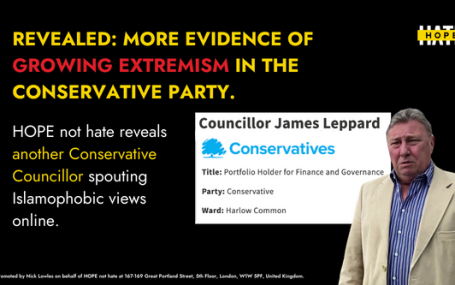HOPE not hate uses cookies to collect information and give you a more personalised experience on our site. You can find more information in our privacy policy. To agree to this, please click accept.
Parliament is divided because the public is divided. For three years this angry, bitter debate has continued to polarise, dominated at the extremes by cries of betrayal and pushing out the pragmatic majority who yearn for a resolution. My inbox is full of demands: to stop Brexit, for a second referendum, to support the Withdrawal Agreement, and most often, to leave with no deal at all. Out on the doorstep it feels like the mood is hardening. We are more divided than ever.
The EU Referendum exposed deep divisions formed over many decades. It should have been a wake-up call. Across the country, while the cities voted overwhelmingly to remain, nearby towns voted in similarly large numbers to leave. This was not the first sign that all was not well in our towns. We had years of falling turnout that we thought was apathy because we couldn’t hear that roar on the other side of silence. The dramatic surge in support for UKIP could not be ignored. It was dismissed as racism but only a small few paused to ask how it happened in towns that have consistently rejected openly racist parties and fought fascism for decades.
On almost every social measure – immigration, social security, the EU – towns and cities have been moving apart for decades. This reflects changing demographics over recent decades as industry in our towns has declined and not been replaced and successive governments have placed investment in towns in the hope that the benefits will trickle out to the surrounding towns. As we’ve shown at the Centre for Towns, cities have grown younger while towns – which were once home to a young population – have grown much older. The loss of working age population has left us at the sharp end of the social care crisis and agency work, unable to sustain high streets, pubs, banks and bus networks. Young people who left for work or study increasingly found when they looked back there was little to return home to. Families were split apart and close communities undone. Eight years of cuts to public services and local spending have made this much worse.
No wonder then that the Hope Not Hate and Centre for Towns report Fear, Hope and Loss found a sense of hopelessness in many of those towns that voted to leave. Alongside this, people in towns are significantly more likely to feel that politicians don’t care about them or their area. The loss of hope coupled with a belief that politics cannot change it is a perfect storm, and fertile ground for a newly emboldened far right.
This is the real story behind the Brexit divisions. It will not be solved by a tug of war between advocates of leave and remain. It can only be solved by dialogue and consensus. In Ireland, Citizens’ Assemblies have been used to break similar deadlock on issues as controversial as abortion and equal marriage. There is still time to establish a similar consensus on our future relationship with the EU. It would pave the way for a substantially different approach in which towns and cities were handed real political and economic power, to allow us to rebuild our economies around the potential we have, not the problems we pose. Brexit was a political earthquake. It demands a similar response.

Cllr James Leppard expressed Islamophobic sentiments and endorsed abuse of Sadiq Khan HOPE not hate can reveal further evidence of the growing problem of extremism…